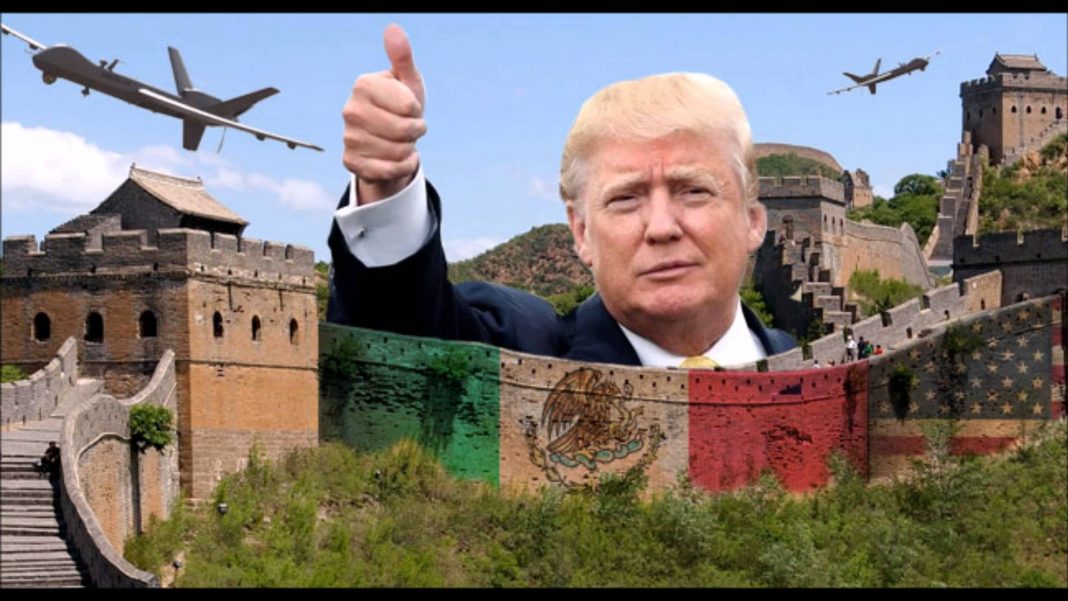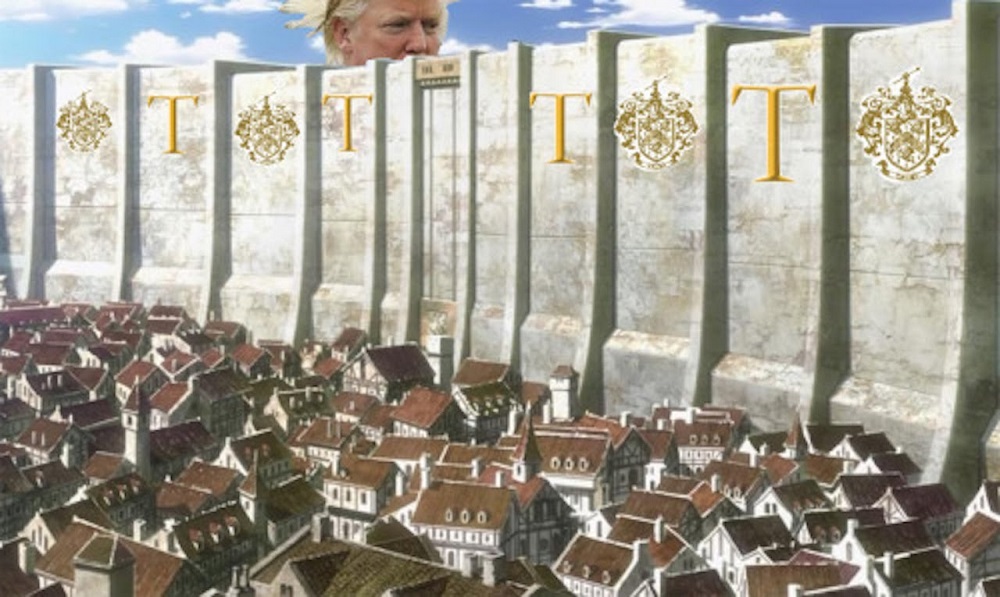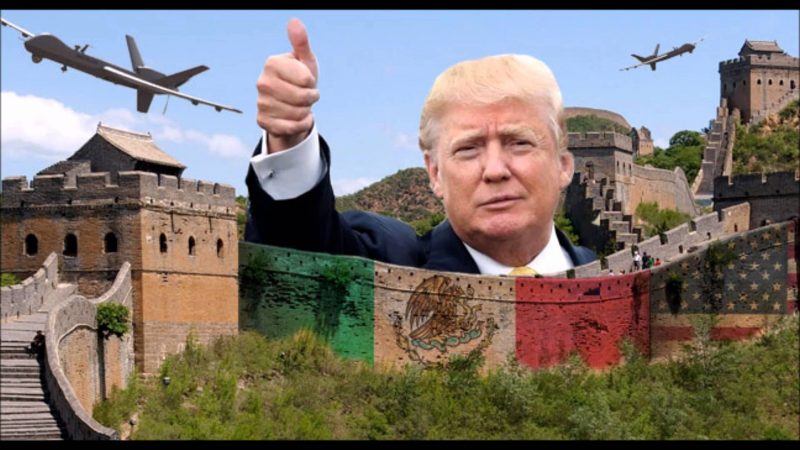
Donald Trump is frantic to get something major accomplished for his first 100 days in office, but he might be responsible for a government shutdown next Friday. Funding for his ‘great beautiful wall’ is being required to be included in the Congressional budget which may not be possible.
Estimates on this wall have ranged all over the place. Originally, the White House claimed it would cost $12 billion, and Republicans pushed the number closer to $15 billion. Then the Department of Homeland Security thought it more like $20 billion, and congressional Democrats are being more realistic with a $70 billion price tag. That would include building and upkeep.
There’s no shortage of problems with this. The president may dream of a giant wall separating the United States and Mexico, but there’s little public support for the project and even less backing for spending billions of our taxpayer dollars on it. (The idea that Trump would get Mexico to pay for this has always been one of the Republican’s more ridiculous campaign pledges.)
A Politico report added, “Republicans said privately it would be helpful for Mulvaney and the White House to concede that the Democrats are not going to fund the wall and move on. But there is a combative element to the divided Trump White House that believes otherwise.”
The main person most interested in the wall is Trump as support among voters isn’t so strong for it. More Americans would rather know their healthcare is safe along with long-term jobs. If there is a government shutdown, the only ones getting hurt will be Trump and the Republican party.
Sadly, the odds of a government shutdown are getting higher as both Trump and White House budget director Mick Mulvaney are digging their heels in for a weeklong fight. Americans have to ask; is a wall really what’s needed most in America as statistics show that illegal immigration from Mexico continues dropping dramatically. Canada is the one who should be thinking more of a wall as they are getting hit with people leaving the United States.
Money for the wall President Donald Trump wants to build along the U.S. border with Mexico must be part of the massive spending bill Congress is preparing, the White House budget director says.
Additional funding also must be included to hire more immigration agents; Mick Mulvaney told media outlets in an interview in which he laid out the top priorities of the president.
Lawmakers hope to unveil the catchall spending bill next week. Democratic negotiators are likely to resist providing the down payment that Mulvaney says Trump wants for construction of the wall, but the former GOP congressman from South Carolina adds that “elections have consequences.”
Mulvaney also said the administration is open, though undecided, about a key Democratic demand that the measure pay for cost-sharing payments to insurance companies that help low-income people afford health policies under the Affordable Care Act.
The $1 trillion-plus legislation is leftover business from last year’s election-season gridlock and would cover the operating budgets of every Cabinet department except for Veterans Affairs.
Talks on the measure have hit a rough patch as a deadline to avert a government shutdown looms late next week. Trump’s presidency is approaching the symbolic 100-day mark, but his GOP allies in Congress have been tempering expectations that the president would emerge as a big winner.
Democratic votes are likely to be needed to pass whatever bill emerges from the talks, and Senate Democrats could bottle it up entirely if they object to provisions that they deem to be “poison pills” – such as the money for the wall. Trump campaigned for president on the promise of building the wall and sticking Mexico with the tab.
GOP leaders on Capitol Hill are eager to avert a shutdown, and the slow pace may make it necessary to enact another temporary spending bill to avert a shutdown next weekend. Mulvaney’s hard line could foreshadow a protracted impasse and increases the chances of a government shutdown.
“A shutdown is never a desired end and neither is it a strategy,” Mulvaney said.
Democrats are confident that Republicans, controlling both House and Senate, would bear the blame for any shutdown, even as Democrats wield power in the talks.
“We have the leverage, and they have the exposure,” House Minority Leader Nancy Pelosi, D-Calif., told fellow Democrats on a Thursday conference call, according to a senior Democratic aide.
Mulvaney said the White House delivered an offer to negotiators Wednesday night, with funding for the border wall a top demand. Other items on the White House priority list, Mulvaney said, are a $30 billion request for a cash infusion for the military and a controversial provision to give the administration greater latitude to deny certain federal grants to “sanctuary cities” that refuse to cooperate with immigration enforcement by federal authorities.
“We want wall funding. We want (immigration) agents. Those are our priorities,” Mulvaney said. “We know there are a lot of people on the Hill, especially in the Democratic Party, who don’t like the wall, but they lost the election. And the president should, I think, at least have the opportunity to fund one of his highest priorities in the first funding bill under his administration.”
He said the wall is “something that’s a tremendous priority for us and that clearly was a seminal issue in the 2016 presidential race.” In spite of Trump’s promise, the cost of a border wall, expected to exceed $20 billion, would likely be borne by taxpayers. And some Republicans are opposed to the wall as well, instead preferring to spend more on technologies such as sensors and drone aircraft to beef up border security.
Democrats have taken a hard line against any money for the border wall and insist that the measure include the “Obamacare” payments to insurance companies.
At issue are cost-sharing payments that are a key subsidy under the health care law to help low-income people enrolled through the law’s insurance marketplaces with their out-of-pocket expenses. Trump has threatened to withhold the payments as a means to force Democrats to negotiate on health care legislation.
The cost-sharing payments are the subject of a lawsuit by House Republicans, and Trump threatened in an interview with The Wall Street Journal last week to drop the payments, which experts warn would severely disrupt Obamacare’s marketplaces.
Mulvaney said the White House isn’t enthusiastic about Democratic demands on the Obamacare payments but is open to them as part of a broader agreement.
“The president has been quoted several times and said he’s inclined not to make them and I can’t tell you that I’m interested in dissuading him from that position,” Mulvaney said. “That being said, if it’s important enough to the Democrats, we’d be happy to talk to them about including that in sort of some type of compromise.”
Added Mulvaney: “If Democrats are interested and serious about compromise and negotiation, the ball is in their court.”
“Everything had been moving smoothly until the administration moved in with a heavy hand,” countered Matt House, a spokesman for Senate Minority Leader Chuck Schumer, D-N.Y. “Not only are Democrats opposed to the wall, there is significant Republican opposition as well.”



